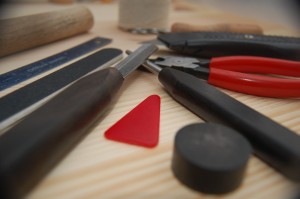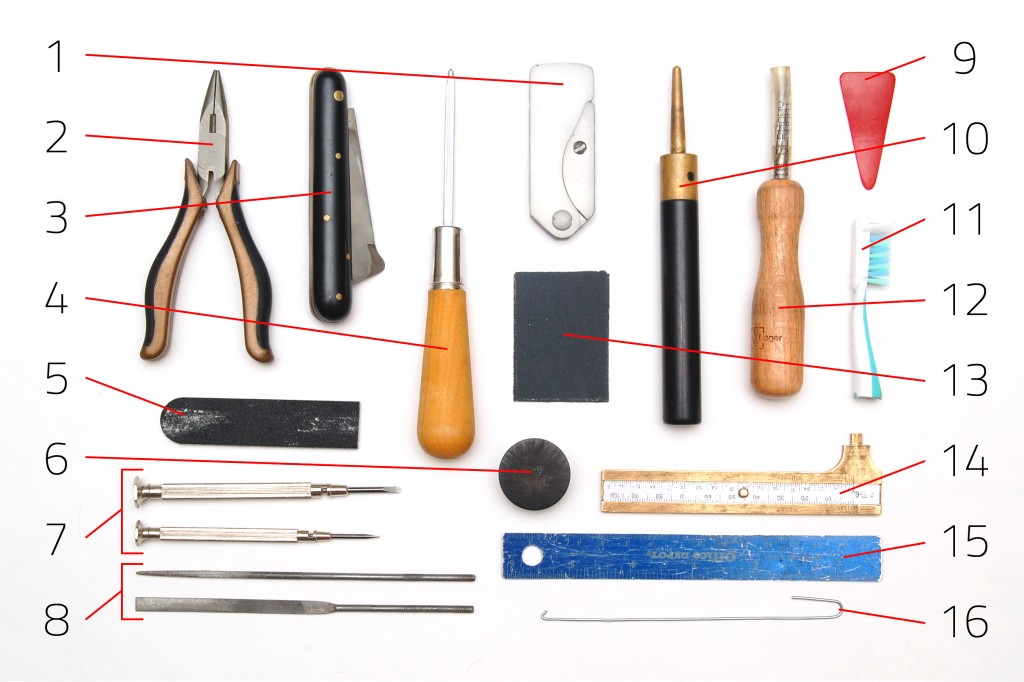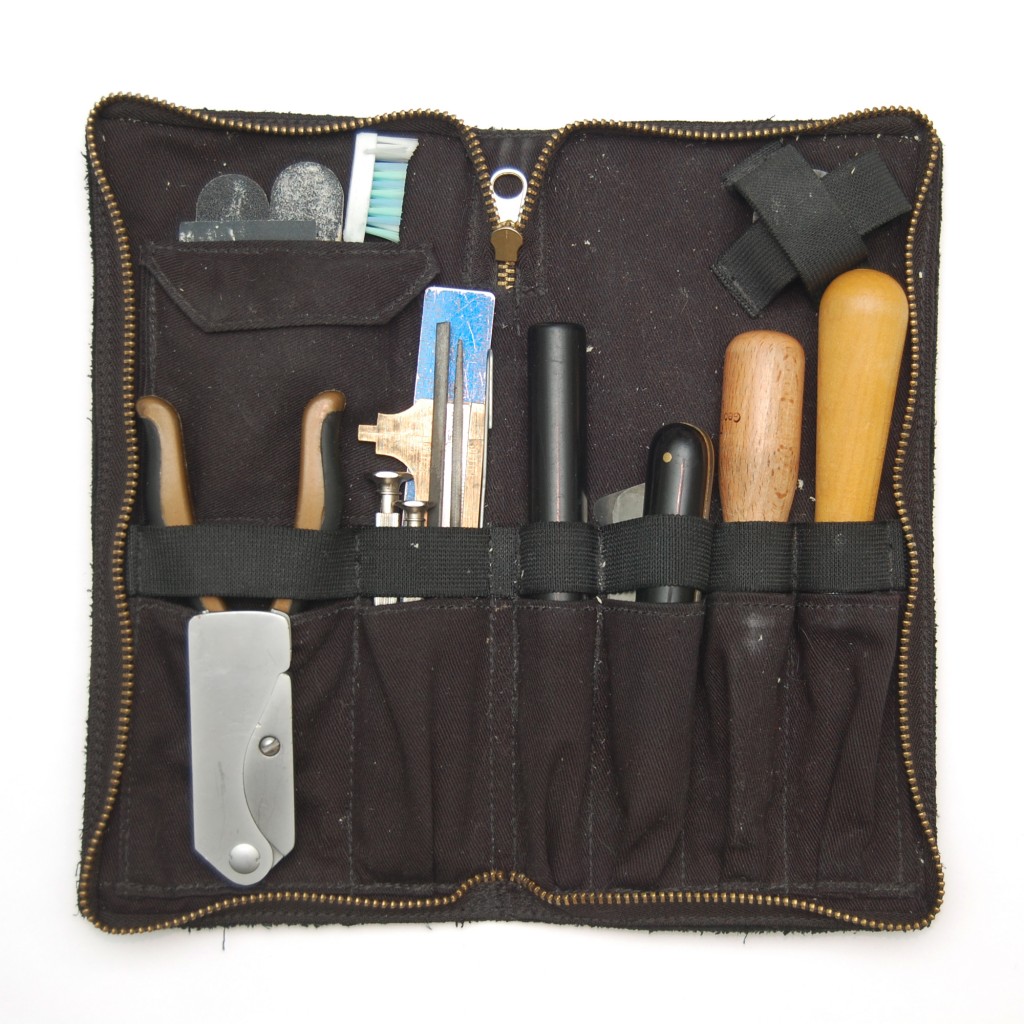 Over the past couple of weeks, I’ve been corresponding with one of my incoming freshmen about what reed tools and materials he’ll need when he arrives at school in the fall. This has inspired me to assemble a real list of the equipment that I want a beginning reed maker to have. I’ve combed the three double reed specialty shops that I typically do business with (Forrests Music, Midwest Musical Imports, and Miller Marketing) along with a few national chains (Ace Hardware, Home Depot, and Walgreens) for the best prices on my recommended items. There are a couple of things that I recommend getting from Barrick Stees and Christlieb Products, as well. For most items I’ve also listed other options, in case you’d like to buy a better knife, or save on shipping by ordering from fewer merchants. I won’t go through exactly how I use all of these now — that’s a topic for another post.
Over the past couple of weeks, I’ve been corresponding with one of my incoming freshmen about what reed tools and materials he’ll need when he arrives at school in the fall. This has inspired me to assemble a real list of the equipment that I want a beginning reed maker to have. I’ve combed the three double reed specialty shops that I typically do business with (Forrests Music, Midwest Musical Imports, and Miller Marketing) along with a few national chains (Ace Hardware, Home Depot, and Walgreens) for the best prices on my recommended items. There are a couple of things that I recommend getting from Barrick Stees and Christlieb Products, as well. For most items I’ve also listed other options, in case you’d like to buy a better knife, or save on shipping by ordering from fewer merchants. I won’t go through exactly how I use all of these now — that’s a topic for another post.
Pliers
Forming pliers (with a smooth hole in the jaws for shaping the tube of the reed) are a specialty item, and there aren’t too many choices in brands. I prefer the orange handled Knipex/Rieger version. These have larger handles than some of the others, and are very well made. They also happen to be the least expensive of the bunch.
Best Price: $45, Miller Marketing (RBPLRS)
Other Sources: Forrests Music (#E‑29), Midwest Musical Imports
Utility Knife
Any basic utility knife will do. I like the kind that take the standard trapezoidal blades, rather than the ones with sectioned snap-off blades. These (along with extra blades) should be easy to find at any hardware store. My standard knife is a beefy-handled retractable Stanley that holds extra blades inside.
Best Price: $4.48, Home Depot
Other Sources: Ace Hardware
Short (Holding) Mandrel
I have a couple of these, one by Fox and one by Rigotti. There are many other brands to choose from, too — all that really matters is that you find one that’s confortable in your hand.
Best Price: $15, Miller Marketing (2X Reed Mandrel)
Other Mandrels: Forrests Music, Midwest Musical Imports
Plaque
I hate the sound a knife makes when it scrapes on a metal plaque, so I stick to plastic ones. Again, I have a few of these, but my favorite is a big red one that also works for contra reeds and is easy to spot when (not if) you drop it in a dark pit.
Best Price: $2, Forrests Music (#G‑21)
Other Sources: Midwest Musical Imports
Reamer
Good reamers are sharp, have multiple fluted spiral blades, and are precisely made to match the taper of a bocal. As a result, they aren’t cheap. Reamers get infrequent enough use that a new student can subsist for awhile by borrowing those of his or her studiomates. But anyone doing serious reed making will need one eventually. I like my Rieger reamer, but there are good reamers for a little less money, too.
Best Price: $79, Miller Marketing (Miller Marketing Pro Spiral Reamer) or $80, Barrick Stees
Other Reamers: Midwest Musical Imports, Forrests Music (#E‑31)
Handheld Torch
I like to heat my forming mandrels before using them (to make the cane more pliable during forming), and have found a small handheld butane torch to be the best heat source. These come in a variety of shapes, sizes, and prices. Mine is an inexpensive hardware store model that simply takes butane lighters as cartridges. This is another item that can be borrowed from studiomates initially, if necessary.
Best Price: $20, Home Depot
Other Torches: Home Depot, Ace Hardware 1, Ace Hardware 2
Forming Mandrels/Drying Rack
I like to form reeds on long mandrels, then allow them to dry before removing them. My pins, which I love, were made by Accurate. Sadly, they’ve now gone out of business, but you can buy similar racks/pins from others.
Best Price: $75, Christlieb Products (6D Chucked Handle ‑and- 7A1 Drying Board w/Brass Forming Mandrel Tips)
Another Option: Miller Marketing (2XMS Reed Forming Mandrel Set)
Easel
My easel is just a six-inch section of tool handle that my undergraduate teacher, Dr. Jeffrey Lyman, cut for me. A 1.25″ dowel will work too, but I prefer the higher-density tool handle wood. You can get very nice purpose-made easels too, but I’ve never seen the need to shell out for one.
Best Price: $1.50, Home Depot ($12 tool handle, can be cut into at least 8 easels)
Other Options: Ace Hardware (another tool handle), Midwest Musical Imports, Forrests Music
Files
Some people make extensive use of files in their reed making; I don’t. I use a round file most often, and occasionally pick up my flat and triangular files, too. You can buy very nice diamond files individually, or get a six-pack of assorted files from most hardware stores. A word of warning — be sure to wash your files before use. They often have residual machining oils that will make your reeds taste awful.
Best Price: $9.40, Forrests Music (#E‑26)
Other Sources: Midwest Musical Imports, Miller Marketing, Ace Hardware, Home Depot
Sandpaper
One package of 320 grit wet/dry sandpaper (usually black or dark grey) will last quite awhile.
Best Price: $6, Home Depot
Emery Boards
Coarse emery boards work like sanding blocks (providing a rigid sanding surface), but are less expensive, easier to manage, and more compact.
Best Price: $2, Walgreens
Cotton String
Another hardware store item — I use thick cotton string to wrap cane during the forming process.
Best Price: $3, Home Depot
22 Gauge Brass Wire
Sometimes you can find this in a hardware store — make sure it’s 22 gauge, though! Larger spools can be ordered from pretty much any double reed supplier.
Price: $8–30, depending on how large a spool you buy
Sources: Forrests Music (#G‑05), Midwest Musical Imports, Miller Marketing
Duco Cement
The old standby reed adhesive. Duco is available in both metal tubes and plastic bottles — which you buy is a matter of personal preference and what your store stocks.
Best Price: $3, Miller Marketing
Other Sources: Forrests Music, Ace Hardware
Now, a few caveats about this list:
- These are the items that I consider essential for my own style of reed making. Other players and teachers will likely have somewhat different lists.
- In listing the best prices for these items, I have tried to find tools that are sufficient for a beginning reed maker. They certainly aren’t the only options, nor are they all the specific models that I use on a daily basis.
- If you buy all of the “Best Price” items on this list, it comes to about $320, not including tax or shipping charges. This may seem like a lot, but consider that with commercial reeds at $15–20 a pop, making your own reeds will recover the cost of tools in relatively short order. If you really want to, you can wait on the reamer and torch, bringing the total down to about $220.
- There are tools I use frequently that I haven’t included on this list, because there are ways of accomplishing the same tasks with those I have listed.
- You will, of course, need something to put all of these tools in. Forrests, Midwest, and Miller all carry nice tool pouches, but you can also just use something you’ve already got or even the shipping box your tools arrive in.
- There is one additional item without which all of this is useless: cane! But that’s a subject for another day.
Although I’ve made this list primarily for my own students, I hope that it will prove to be useful for others, as well. Happy reed making!


